A Thread of Silk, a Story of Grace
Near the town of Serres, Anna…
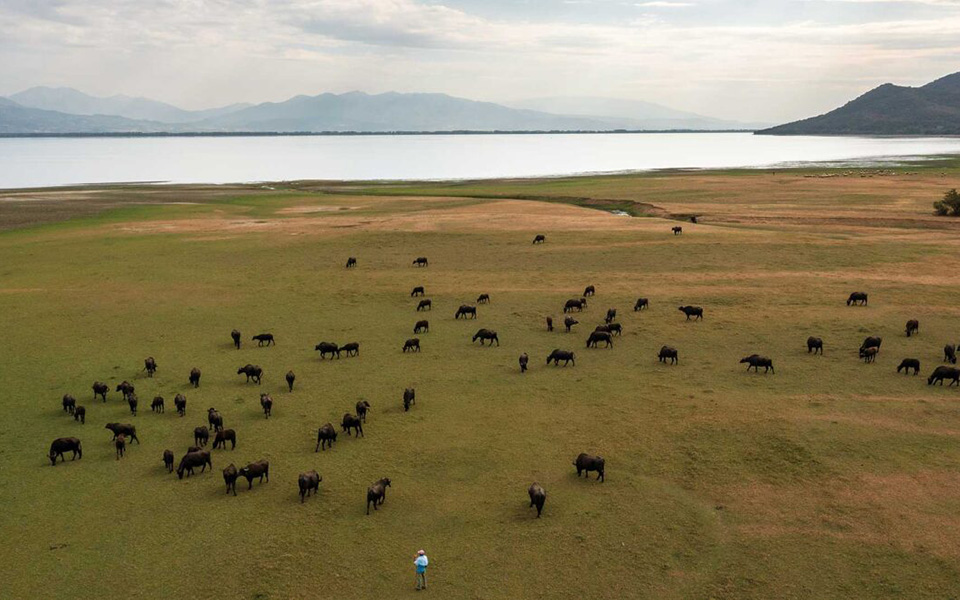
On the shores of Lake Kerkini. The Papadopoulos family started with a herd of 10 buffaloes, now they have 300.
© Konstantinos Tsakalides / SOOC
It’s early October. The morning sun dispels the humidity from the grass surrounding Lake Kerkini in Central Macedonia. Around seventy water buffalo graze peacefully, wallowing in the mud, against the backdrop of the imposing Belles Mountain Range, which serves as the natural border between Serres Prefecture and Bulgaria.
In 2001, Vasilis and Eleni Papadopoulos established a unit for the breeding, processing, and standardization of meat from Greek water buffaloes, a local breed that has lived in the region since antiquity. The family grows 50% of the food for the animals, which roam and graze freely on open ground from April to October. The buffaloes spend the rest of the year inside the stables. Calves spend six months close to their mothers before remaining in the facility for about a year until they reach the required weight of approximately 200 kilograms.
Kerkini Farm
Kerkini, Serres
Tel. (+30) 23270.411.51
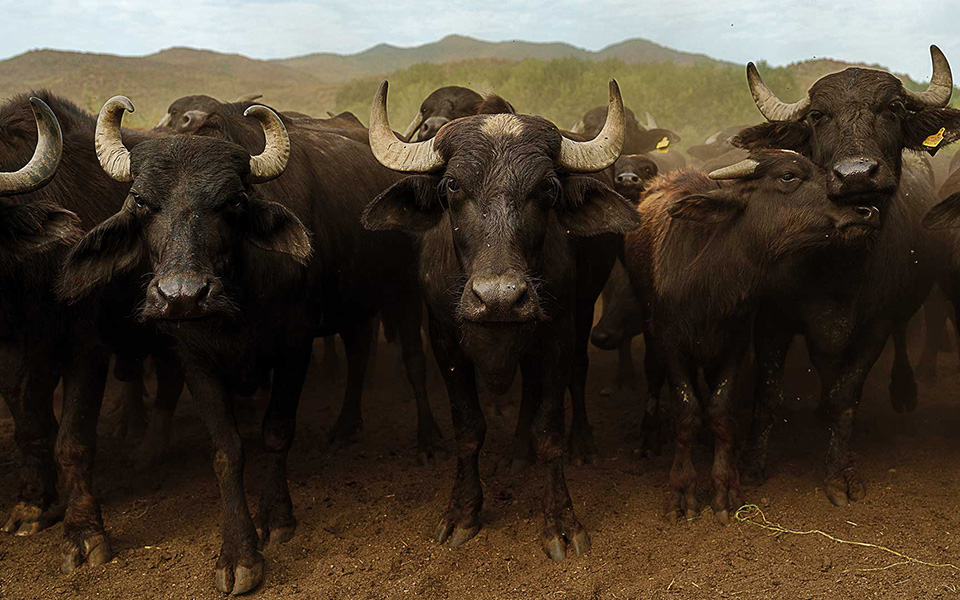
The Greek water buffalo has been present in the area since ancient times.
© Konstantinos Tsakalides / SOOC
“On average, we produce twenty tons of buffalo meat each year. We also buy some young calves from other producers, but the most important thing is that they are raised healthy,” explains Stavros Papadopoulos, a student at the University of Thessaly’s Department of Agricultural Engineering Technologists who is researching nutritional models for producing even higher-quality meat.
According to a table in the family’s butcher shop in Kerkini, a study conducted by the University of Naples found that buffalo has a higher protein and iron content than other types of meat.
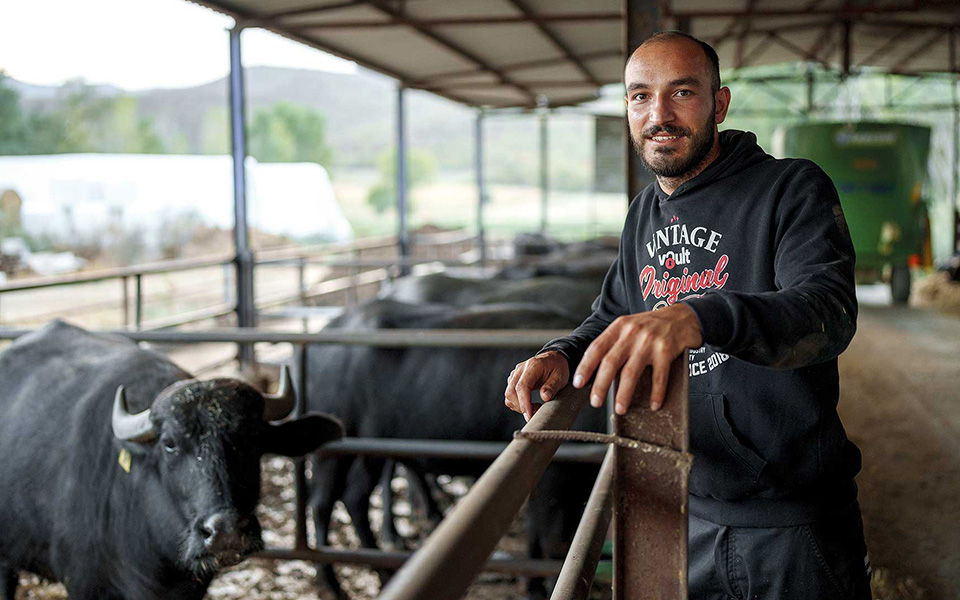
Stavros Papadopoulos and his brother are actively involved in the farm.
© Konstantinos Tsakalides / SOOC
It all started in 1999, when Vasilis Papadopoulos and his wife Eleni Avramidou decided to close their taverna and open the “Bilis – Kerkini Farm” butcher shop. They were looking for something with more stable working hours so that they could spend time with their two sons, Kleanthis and Stavros.
Vasilis and Eleni had been raised on farms, surrounded by animals. Initially, they sold beef and pork products, fresh sausages, and sujuks made from locally bred livestock. Two years later, in an effort to establish a regional trademark, they hung buffalo meat in their shop window. “Most people didn’t eat buffalo meat. They associated buffalos with farm work,” recalls Eleni. However, as time passed and buffalo kavurma became their flagship product, demand increased, and, in 2013, their butchery turned into Kerkini Farm.
Today, with both of their sons actively involved in the business they raise approximately 300 buffaloes per year, export 5% of their output, generate a turnover of around 700,000 euros, and sell their products throughout Greece. “We are constantly developing new recipes to meet customer demand. Our goal is to eventually sell products that don’t contain any preservatives,” notes Vasilis as he gives me a tour of the processing and standardization facility, which is located right behind the butchery.
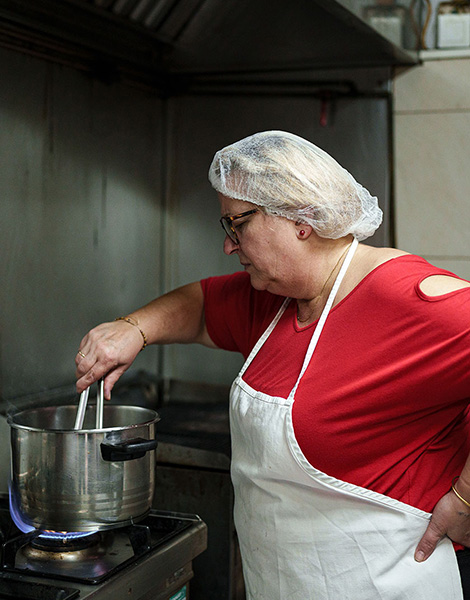
Eleni Papadopoulou cooking buffalo meat.
© Konstantinos Tsakalides / SOOC
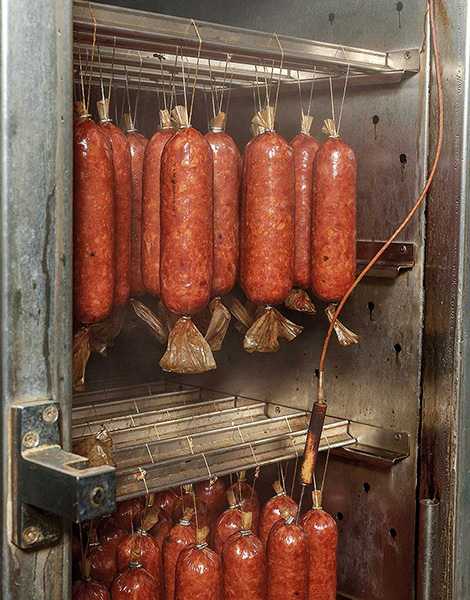
The buffalo meat is free from preservatives.
© Konstantinos Tsakalides / SOOC
Their buffalo meat kavurma and sausages, made without preservatives, outperformed other similar products at the blind tasting competition organized by “Gastronomos” magazine.
Kavurma is produced as follows: buffalo is carefully cut and trimmed. Parts that will be used for fresh products are separated from those that will be used for deli products. The parts used in kavurma are cut up into small cubes and boiled for four hours. The kavurma is seasoned with pepper, herbs, salt, and a special vegetable stock before being refrigerated in special paper containers to cool. They do not use lard because they prefer their kavurma to be as lean as possible.
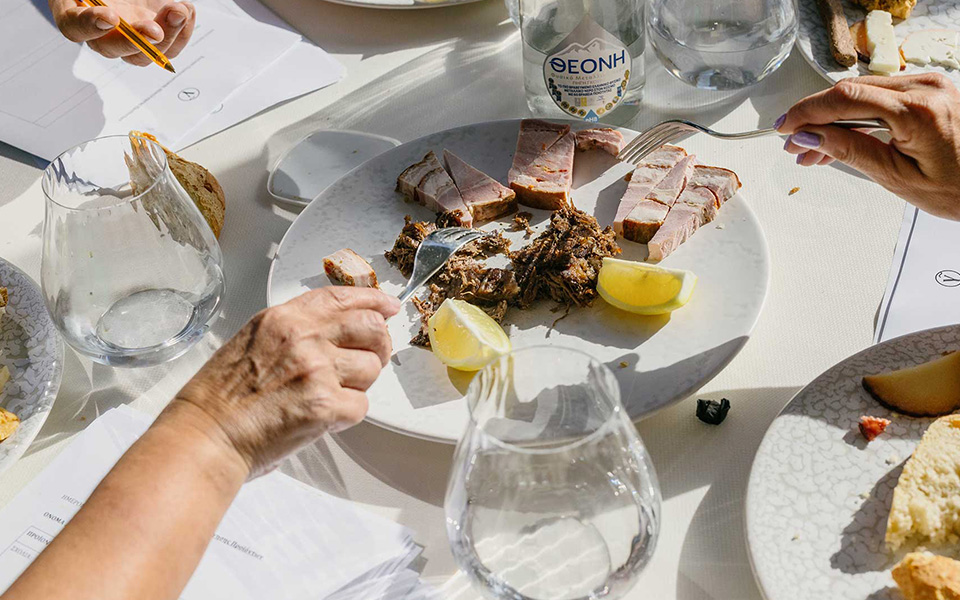
A blind tasting of products from Kerkini Farm.
© Angelos Giotopoulos
They make a variety of other delicacies besides kavurma, including buffalo sausages with leek and oregano, semi-dry salami, sujuks, and burgers. In 2001, they founded a new company, Agro Kerkini, to target supermarket chains.
The most important thing is that Vasilis and Eleni have managed to stay in this rural place due to their tenacity and love for each other; they have been married since 1989. And together with them, their two sons and ten employees have also settled here.
Kerkini Farm won First Prize at the 16th Gastronomos Quality Awards, organized by Gastronomos, Greece’s leading food magazine and held in December of 2023.
This article was previously published in Greek at gastronomos.gr.
Fresh buffalo meat products, vacuum sealed, can be ordered from select meat shops and delicatessens across Greece.
In Athens, visit 4 Seasons at Syntagma Square, Papoulias, and Stelios Meat Shop. In Thessaloniki, visit Kentrikon and Chatziaggelidis Meat Shop.
Their deli products are available in Athens at Syn Allois and Thanopoulos. In Thessaloniki, visit To Pantopoleio tis Thessalonikis and Green Family Ellinikon. In Chania, Terra Verde.
For more information on Kerkini Farm’s distribution network, you can visit the website.
Near the town of Serres, Anna…
Whether you want to add a…
A new mobile app helps travelers…
Piraeus Bank supports the agricultural sector